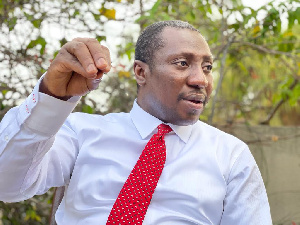- General News
- Crime & Punishment
- Politics
- Regional
- Editorial
- Health
- Ghanaians Abroad
- Tabloid
- Africa News
- Religion
Politics of Tuesday, 25 January 2022
Source: ghanaiantimes.com.gh
We‘ll address E-Levy concerns – Deputy Majority Leader
The Deputy Majority Leader in Parliament, Alexander Kwamina Afenyo-Markin, has admitted that there are some legitimate concerns about the controversial E-Levy which need to be addressed.
According to him, the proposed rate and concerns about waste in the public finance system are examples that must be resolved to present a refined and compelling E-Levy proposal that the good people of Ghana cannot reject.
Mr Afenyo-Markin, who also is the Member of Parliament for the Effutu Constituency in the Central Region, was addressing the opening session of a two-day workshop held for the Majority Caucus in Parliament at Kwahu Nkwatia in the Eastern Region.
He indicated that such a proposal must include viable measures to enhance financial accountability and guarantee greater protection of the public purse.
He said that it is a truism that despite the funding challenges that persisted, the government has over the last five years worked hard to reform the structure of the economy, found new ways to expand access to education, build roads, health infrastructures and many more.
He added that given the remarkable successes that the NPP government had achieved so far, especially at a time when the devastating consequences of the COVID-19, a global pandemic persists, he was confident that the government could continue with the momentum and the retreat.
Meanwhile, he said it must be admitted that the country also required a desperate innovative initiative to help generate more revenue internally to fund and deliver the promise of a flourishing democracy and share economic growth and prosperity for all.
Mr Afenyo-Markin noted that the government needed more revenue to urgently improve the educational infrastructure to make it a wealthy competitive product in the global arena.
“We need increased revenue to build a reliable and sustainable health system that delivers healthy and caring outcomes for all our citizens. We need the required revenue resources to build expansive road infrastructure and strategic transport systems that open all parts of the country for the economic boom that our people crave for,” he added.
He also added that the country needed innovative revenue measures to help build robust energy infrastructure to power the fast-expanding economy to create more sustainable jobs in the manufacturing and the service sector.
Above all, he said the nation required a bigger pie of the sustainable revenue to modernize agriculture and improve yields in transformative ways to make the country self-sufficient in food production and establish Ghana as a global powerhouse and sustainable agriculture.
The Deputy Majority Leader believed that the introduction of the E–Levy was a necessary part of the financial solutions the government was seeking and that the foregoing point should form a critical part of the message they, as members of parliament, must take back to all corners of the country.
Entertainment










